#SecurityScan 31: Increasing violence in Punjab, US Air Force's F-35 to debut at Aero India and more
20 Feb 2023 12:27:23
This article is a summary of important events that have taken place in last one week affecting, India's national security.
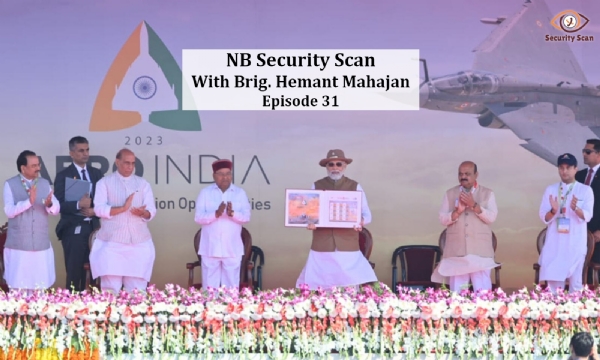
Democratic World Countering Chinese Hybrid war
UK takes a relook at ammunition reserves; bets big on India
As the UK is taking a relook at its ammunition reserves in light of the long drawn conflict between Ukraine and Russia, a key minister is betting big on involving Indian companies into the weapons supply chain and creating capabilities that can manage existing requirements and future needs
US fighter jets shoot down octagonal object near Canadian border, 4th in a week
Though it did not pose a military threat, the object could have potentially interfered with domestic air traffic as it was traveling at 20,000 feet (6,100 m), and it might have had surveillance activities, the Pentagon said. Read more
How China's balloon sent the US on a hunt for flying objects. The result has been a spate of unprecedented shoot downs of mysterious objects - including on Sunday an octagonal structure downed by an F-16 over Lake Huron.
Taiwan says it reserves right to shoot down Chinese balloons
"The ministry has rules in terms of response and will continue revising the rules in a timely manner to respond to new threats such as balloons," Defence Ministry spokesperson Sun Li-fang said on Monday. "The military will adopt appropriate measures, including shooting threats down, according to the level of concern.
US holds drills in South China Sea amid tensions with China
The 7th Fleet based in Japan said Sunday that the USS Nimitz aircraft carrier strike group and the 13th Marine Expeditionary Unit have been conducting "integrated expeditionary strike force operations" in the South China Sea.
Philippines says China coast guard used "laser" to disrupt resupply mission
Philippines accuses China of using 'military-grade' laser against its vessels.The president's first visit to Japan since taking office came after he recently granted the United States access to additional military bases in the Philippines under a VFA, a move that China said undermined regional stability and raised tensions. The VFA provides rules for the rotation of thousands of U.S. troops in and out of the Philippines for exercises.
US renews warning it'll defend Philippines after China spat
U.S. State Department spokesperson Ned Price said China's "dangerous operational behavior directly threatens regional peace and stability, infringes upon freedom of navigation in the South China Sea as guaranteed under international law and undermines the rules-based international order.
Balloon Warfare
The Chinese balloon that traversed the US was capable of collecting communications signals and was part of a military-led spy program that spanned more than 40 countries, Biden administration officials said.
The Biden administration presented the new evidence in a State Department fact sheet on the balloon’s capabilities and in open hearings and closed briefings on Capitol Hill Thursday, as they sought to counter China’s insistence that it was a harmless weather-monitoring device .
China has operated a fleet of high-altitude balloons, like the one shot down by the Air Force, to carry out surveillance on five continents, the Biden administration said, as it tries to bring international attention to the scope of Beijing’s program.
Administration officials embarked on a series of briefings about the balloon with allies and partners, officials said. Those briefings draw on “what we’ve learned based on our careful observation of the system when it was in our airspace,” Secretary of State Antony Blinken said Wednesday.
Taiwan
Why the high cost of conflict may be the best hope for peace in the Taiwan Strait
Military and China-US relations experts point to signs that both sides are strengthening their combat readiness.Any potential war sparked by the escalating Taiwan issue risks involving Washington’s allies in the region, US Think tank.
Countering Chinese Multi Domain War Against World
'Made in China' infrastructure is often a glorified money pit
Construction flaws have left many Belt and Road projects unusable. It is not too late to learn the lesson that "Made in China" projects are glorified money pits at best, and serious security threats at worst.
There should be no excuse for continuing to pay a China for worthless infrastructure.
Australia to remove Chinese surveillance cameras amid security fears
Australia will remove Chinese-made surveillance cameras from defence sites over national security fears.
It comes after an audit found 900 pieces of surveillance equipment built by companies Hikvision and Dahua on government estates.The UK and US made similar moves last year, citing fears the device data may be accessed by the Chinese government.
India Internal Security
Increasing violence in Punjab
“Had we not run away, protesters would have killed us: Cop”. This admission was from an FIR registered by the UT police regarding a clash between protesters and police personnel in which police vehicles were damaged and several cops injured last week. “The attackers took away 20 police barricades, a teargas handgun and ammunition, helmets, shields and body protectors.”
The lethal combination of easy availability of drugs, arms and finance feeds the activities of the radicals, whose numbers appear to be increasing.
This is an admission of a boldly planned and well-executed action on the part of the protesters and almost complete unpreparedness on the part of the police. The declared purpose was to proceed to the office/residence of the Punjab CM, but they were prevented from doing so by the police because of the fear of a law and order problem .The number of protesters kept increasing and they carried kirpans and lathis, they had horses and tractors and they used the tractors to bulldoze the barricades. This site is one of the main entry points to Chandigarh .
This incident, is a deeper web is being spun by forces inimical to the state and the nation. There are daily reports of gang warfare in Punjab and one is confused by the multiplicity of names and gangs. Further reports indicate that people are being targeted on the orders of gang leaders residing abroad, i.e. Canada, US, Australia, UK, Pakistan, etc. Arms are being supplied through drones and carriers are also coming in from other heartland states. Going by the rule of thumb, whatever is being captured is only 10 per cent of what has gone through. Even in case of seizures, very few carriers or suppliers or their financiers have been caught. The same is true of drugs.
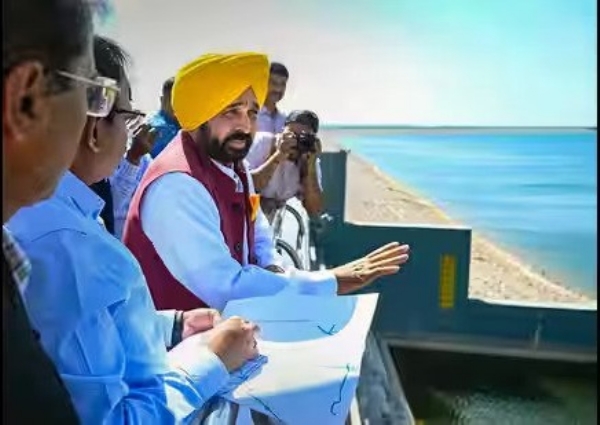
Persons at the highest levels of the government are admitting to the easy availability of drugs. In addition to drugs coming across the land border, heavy quantities are also coming in from coastal areas. Drugs are not only used to weaken the moral and physical fibre of our youth but also used to finance radical activities. This lethal combination of easy availability of drugs, arms and finance feeds the activities of the radicals, whose numbers appear to be increasing.Many seen and unseen hands, it seems, are at work to reproduce past scenes of violence, anarchy and mayhem on Punjab’s canvas.
Time to confront these forces is now.
India-External Security
Prime Minister Narendra Modi inaugurates Aero India 2023 with hopes of local production boost
The 14th edition of Asia's largest aero show, Aero India 2023, kicked off in Bengaluru on Monday. The five-day event focused on displaying indigenous equipment/technologies and forging partnerships with foreign companies. The event also helped in integrating domestic MSMEs and start-ups in the global supply chain and attract foreign investments including partnerships for co-development and co-production.
Aero India 2023, Asia's largest aero show, ran from February 13 to February 17, displaying locally-produced equipment and technologies to attract partnerships with foreign companies. India, under its "Make in India" policy, has been keen on manufacturers such as Lockheed Martin Corp, Boeing, and Airbus to make more than parts in the country and share technology.
Prime Minister Narendra Modi on Sunday spelled out India's ambitions to become a major defence hub as global firms flocked to the mega Aero India 2023 in Bengaluru for a slice of the nation's massive import budget.
While addressing the curtain raiser of 'Aero India' 2023, which will begin from Monday, the Defence Minister said, "We are putting in all efforts to see that Tejas becomes 100 per cent indigenised. That is our ultimate aim."
A full-scale Light Combat Aircraft (LCA) Tejas in final operational clearance (FOC) configuration was at the centre stage of 'India Pavilion' at Aero India 2023.
US Air Force's F-35 to debut at Aero India 2023
After a journey from Hill Air Force Base in Utah, US F-35A Lightning II Demonstration Team will impress crowds with a demo of its unique aerial capabilities The F-35A Lightning II from Eielson Air Force Base in Alaska was on static display.
GE to provide digital solutions for LM2500 gas turbines for Indian Navy's new IAC-1 Vikrant
Russian arms supplies to India worth $13 bln in past 5 years
India is the world's biggest buyer of Russian arms, accounting for around 20% of Moscow's current order book, and New Delhi has not explicitly condemned Russia's invasion of Ukraine. Indian Prime Minister Narendra Modi has called for dialogue and diplomacy to solve the conflict, now in its 12th month.
UK's planned transfer of Jet engine tech historic
Jet engine advanced core technology is a key know-how that India has been looking for to cut dependence on foreign suppliers. Chalk said a sovereign and resilient India was important for the entire world considering growing global dangers and China's "belligerence" challenging the international rules-based order.
Technological Security
Fighting coercive technological dominance
India’s semiconductor sector heats up amid US support
India’s semiconductor space is heating up, with the country likely to be a beneficiary of the tussle between the United States and China for technological supremacy.
The US, which in 2022 introduced export controls, among other measures, to restrict the sale of chips or chip-making equipment to China, has sought to encourage India’s fledgling semiconductor industry.
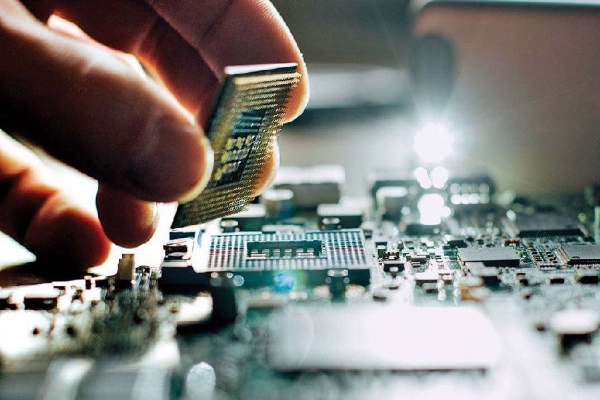
The two countries discussed “bilateral collaboration on resilient semiconductor supply chains” and manufacturing at the inaugural meeting of the India-US Initiative on Critical and Emerging Technology on Feb 1.
Commerce Secretary Gina Raimondo will travel to India in March to discuss collaborating on making semiconductor chips.The Commerce Secretary said India is making “a lot of the right moves,” despite continuing to purchase Russian oil.India must comply with rule of law labor standards before any deal with the U.S. can be reached, said Raimondo.
India’s growth in aerospace and defence capabilities
THE theme of the 14th edition of Aero India, ‘The runway to a billion opportunities’, seeks to showcase India’s growth in aerospace and defence capabilities. At the inauguration of Asia’s biggest military airshow, Prime Minister Narendra Modi spoke about the quest for self-reliance. Once the biggest importer of weapons, the country now exports to 75 countries. The defence exports have increased six times in the last five years and crossed $1.5 billion. His message to the private sector was to not miss the opportunity. The five-day event aimed to promote the export of indigenous air platforms. Companies from 98 countries took part.
Defence Minister Rajnath Singh laid out the roadmap before the top honchos of aerospace majors. India does not want to remain an assembly workshop for military platforms, he conveyed; it wants to manufacture cutting-edge products. Pressing global manufacturers to produce more locally, he spoke of creating symbiotic relationships — ‘we want to build with you, launch with you, create with you and develop with you.’ He has already indicated bringing more weapons and systems under an import ban. During the last 30 months, the import of 411 military items has been barred to give a push to Make in India.
The import substitution plans are laudable for the thrust on indigenisation, but there are concerns that these tend to sidestep the fact that enormous amounts of investment and years of research are needed for developing world-class weapon systems. Just recently, the Ministry of Defence came out with sobering information. As many as 23 of the 55 ‘mission mode’ projects of the Defence Research and Development Organisation are running behind schedule. These high-priority programmes are based on the specific operational requirements put forth by the forces. Delays could affect their operational efficiency. Big ideas need well-thought-out plans.
Securing supply chain
Lithium
THE discovery of nearly 6 million tonnes of lithium deposits for the first time in the country in Reasi district of J&K — spells a jackpot as this mineral is in huge demand for a world running out of time to shift to eco-friendly ways of life. Called ‘white gold’, the precious metal is crucial to projects requiring both chargeable and non-chargeable batteries in fields such as clean energy, transport. The targets for making electric vehicles and moving away from carbon-emitting fuels are also dependent on lithium.
Among the challenges is ensuring environment-friendly excavation in the ecologically fragile Himalayan surroundings of Reasi. Till then, India will have to keep importing lithium as deadlines for its various projects aimed at zero-carbon emissions draw near. At the same time, India would do well to orient its policies around the valuable lithium to its best possible advantage, both economically and ecologically.
Economic security
Protecting investors-Time to relook at the regulatory mechanism
IN asking the Securities and Exchange Board of India (SEBI) and the Centre to strengthen the regulatory framework to protect Indian investors, the Supreme Court has flagged the concerns arising from the volatility in the stock markets over the past two weeks.
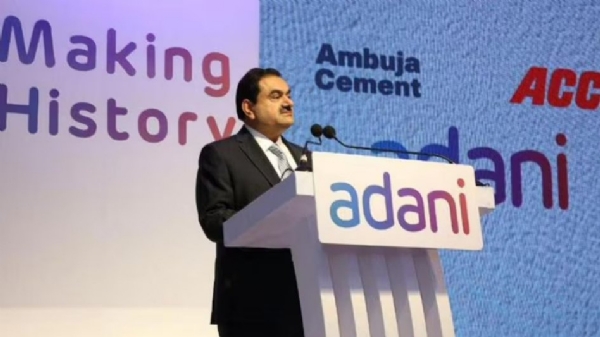
The market cap of nine Adani Group companies has fallen by half following allegations of stock-price manipulation and accounting fraud levelled by US-based short-seller firm Hindenburg Research. The conglomerate, which has seen a phenomenal rise in recent years, has dismissed the charges but the worries persist. The apex court’s self-admitted cautious approach ‘we are conscious that whatever we say may also affect the market, it runs largely on sentiments’ comes with a suggestion for an expert committee that could confer wider powers on the market regulator.
Small investors also park their money in equities these days. The broad message is to scale up security measures, redefine SEBI’s role and make the processes more useful in tackling complaints. What will retain the interest of investors, both Indian and foreign, is how regulators respond to the allegations that crop up.This as an opportunity to ensure greater transparency on the funding sources of companies that hold stakes, along with formulating norms on the leverage limits of corporates. It is time to strengthen corporate governance standards, and to be better prepared to handle attempts to manipulate prices. It’s time for a relook at the role and powers of regulators such as SEBI.
Diplomatic Oppertunities-
The war between Ukraine and Russia is violent
For much of the winter, the war in Ukraine settled into a slow-moving but exceedingly violent fight along a jagged 600-mile-long front line in the southeast. Now, both Ukraine and Russia are poised to go on the offensive.
Will Logistics Be Russia's Undoing in Ukraine?
Russia's experience in Ukraine one year in is an example of what happens when a nation tries to fight a war without fully considering the logistics and sustainment that go alongside such a fight. The consequences for failing to fully consider these concepts drove Russia into a prolonged conflict for which it was already ill-prepared a year ago, with increasingly dire consequences for its future.
National Security Adviser Ajit Doval’s visit to Moscow last week to attend a meeting of regional security advisers yielded a diplomatic bonus — a separate audience with the Russian leader Vladimir Putin. Engagement with the top national security officials in the region is a valuable tool.
Putin’s decision to break the protocol and meet NSA is most important outcome from Doval’s Moscow visit. The Russian president rarely meets foreign cabinet ministers let alone security officials. That Doval’s audience with Putin came after the Indian national security adviser’s recent visits to Washington and London — which are leading the Western coalition to support Ukraine in its efforts to vacate the Russian aggression that began a year ago this month has also lent a special context to Doval’s talks in Moscow.
The war in Ukraine is set for a massive escalation in spring as both Moscow and Kyiv prepare to launch major military offensives. The massive costs of the war are also boosting voices demanding early diplomatic negotiations to end the war. Delhi, which has consistently called for cessation of violence and dialogue in Ukraine, is preparing to host the G-20 and SCO summits this year, and will be expected to play a constructive role in facilitating the dialogue between Russia, Ukraine and the West. Keeping channels open to Russia while sustaining the engagement with the West are critical preconditions for any effective Indian diplomacy on Ukraine.Delhi’s tightrope walk between Russia and the West has been impressive so far; but the war gives tremendous opportunities to India for showing its diplomatic deftness in ending the war.
Information Warfare
BBC not holy cow
With India playing a pivotal geo-political role in securing global supply chains, stimulating global economic growth and harmonising security interests, it makes one wonder who stands to benefit from the destabilising effects of global media narratives on Indian democracy.
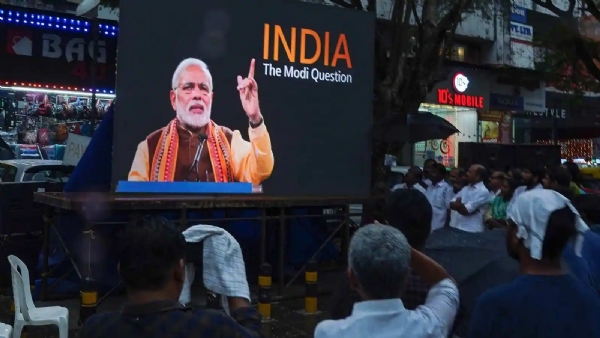
The BBC’s tax woes in India are the outcome of persistent non-compliance with the laws of the land even after several notices. The blurring distinction between public broadcasting and commercial media operations cannot be an excuse for non-compliance with tax laws. Deeper scrutiny of such non-compliance cannot be construed as an assault on freedom of speech. The misplaced journalistic outrage over the scrutiny of the BBC’s taxes is reflective of the herd mentality and group-think with which democracy in India has been judged lately. One wonders if the journalistic community would show the same conviction in putting the BBC in the dock once the truth about its tax evasion in India is revealed.
Indian democracy is not a petri-dish for the global media’s experiments with the truth, stretching the boundaries of journalistic privilege at the expense of this country’s territorial integrity and the integrity of its institutions. Journalistic freedoms do not exist in a vacuum and media outlets must take responsibility for their conduct both editorially and commercially. Global media activism that seeks to destabilise Indian democracy cannot claim immunity from scrutiny by the Indian state under the pretext of freedom of speech.
--
